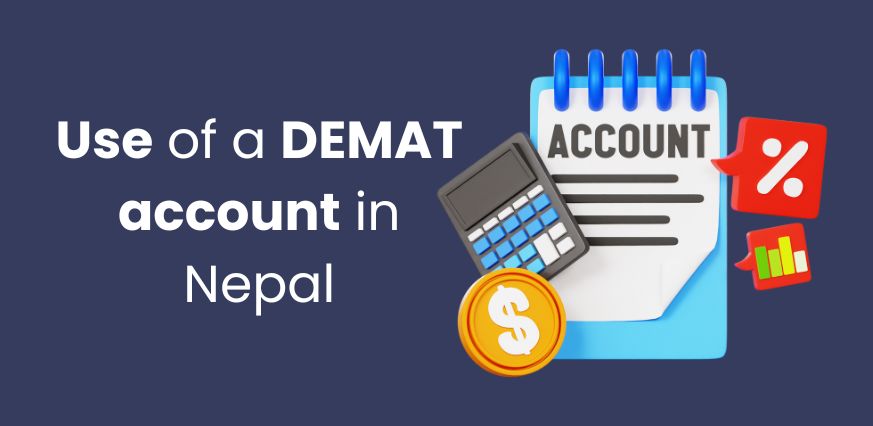A DEMAT account is an account that dematerializes physical documents, allowing you to store your securities in electronic form, thereby reducing the chances of loss or damage.
You can open a demat account online by completing an application form through a bank or a depository participant (DP). The DP registers the beneficiary’s details (the account holder who can deposit securities into CDSC through the DP) into the system. Once the registration is complete, the CDSC provides a unique 16-digit DEMAT account number, which is used in the future for securities transactions.
What is the use of a DEMAT account in Nepal?
Here are the key uses of the Demat account:
- Storage of Securities: Securely stores shares, debentures, and other securities in electronic form.
- Trading and Transactions: Facilitates the buying, selling, and transferring of securities in the stock market.
- Dividend and Benefits: Automatically credits dividends, bonuses, and rights shares directly to the account.
- Ease of Management: Simplifies record-keeping and reduces risks of loss, theft, or damage to physical certificates.
- Mandatory for Stock Trading: Required to trade securities on the Nepal Stock Exchange (NEPSE).
In Nepal, DEMAT accounts are managed by the Central Depository System and Clearing Limited (CDSC).
What are the features of a Demat account?
The features of a Demat account are as follows:
- You can apply for Initial Public Offering from your device(mobile phone or computer).
- Helps you manage your shares online.
- You can transfer shares immediately, without any hassle.
- Share transactions happen faster.
- The listed company can credit the bonus shares given to the shareholder’s bank account directly.
- It can distribute cash dividends directly to shareholder’s bank accounts.
How many Demat accounts can a person have?
In Nepal, you can have two demat accounts. One demat account cannot be shared by family members.
However, it is not necessary to have multiple accounts. And it is also easier to buy and sell stocks using just one demat account.
What are the requirements to create a Demat account in Nepal?
- You will be required to have proof of identity like citizenship, passport, driver’s license, or a Rastra Parichaya Patra)
- Bank Statement showcasing the proof of address.
- Your passport-sized photo.
- PAN card (Permanent Account Number)
In the case of a minor:
- Passport-sized photo of the child.
- Photocopy of the child’s birth certificate.
- Photocopy of the guardian’s citizenship.
You may also like:
FAQs
What is a Demat Account used for?
A Demat account is used to hold the details of the customer’s stocks, debentures, and mutual fund units.
What is the difference between a demat account and a normal bank account?
Your normal bank account holds your monetary deposits but, the demat account holds your shares and securities.
Can I keep money in my Demat account?
No, you cannot keep your money in your Demat account. It can simply hold your company shares.
What is the disadvantage of a demat account?
There are no serious disadvantages to having a demat account but, you will have to pay a small fee periodically and it is prone to hacking since it is online.
How much does it cost to open a Demat account in Nepal?
It costs Rs. 50 to open a Demat account in Nepal.
Can I delete my Demat account?
You have to go to the bank a fill out a closure form to close your demat account. You cannot deactivate it from your phone online.
Is a Demat account mandatory in Nepal?
Yes, the investors must dematerialize all the share-related documents. This is why a Demat account is mandatory in Nepal.
Conclusion
Some of you may wonder if you can buy and sell shares without a Demat account. Even if you know a potential buyer or a seller, you cannot do it without a demat account. It is a standard practice to do all of the share-related transactions through a demat account.
And if you are a beginner, you cannot apply for IPO(Initial Public Offering) without a Demat account.


